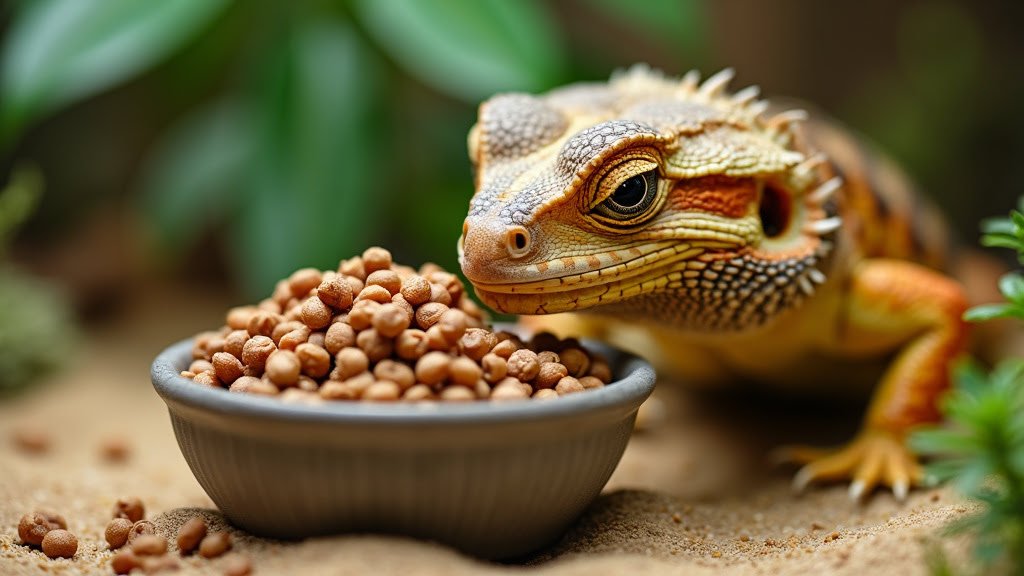Bearded dragons are fascinating, inquisitive reptiles that make wonderful pets. But, like all pets, they depend on us to provide a balanced and nutritious diet to keep them healthy and happy. So, it’s no wonder that many bearded dragon owners ask the question: Can bearded dragons eat lentils? Today, we’ll explore this topic in depth, shedding light on the safety and benefits of lentils for your scaly companion.
Understanding the Diet of Bearded Dragons
Natural Habitat and Typical Diet
In the wild, bearded dragons are found in the arid landscapes of Australia, roaming the desert and scrublands. Their diet is quite eclectic, including a variety of insects like crickets and mealworms, as well as plant matter such as leaves, flowers, and the occasional fruit. This omnivorous habit ensures that they get a mix of proteins, carbohydrates, and essential nutrients to thrive in their natural habitat.
Nutritional Requirements
For a pet bearded dragon, mimicking this natural diet as closely as possible is key. A well-balanced diet includes a combination of proteins, vegetables, and occasional fruits, tailored to their specific nutritional needs. Protein is crucial for growth and muscle development, while calcium and Vitamin D3 are essential for bone health. Let’s not forget the importance of vitamins and minerals to support overall well-being.
Lentils: Nutritional Profile
What Are Lentils?
Lentils are small, lens-shaped legumes that are a staple in many cuisines around the world. Available in various types, including brown, green, red, and yellow, lentils are renowned for their high protein content and versatility in culinary applications. They are rich in fibre, vitamins, and minerals, making them a popular choice for human diets.
Nutritional Content of Lentils
Lentils boast an impressive nutritional profile, packed with protein, fibre, iron, and B vitamins. They are also low in fat and rich in complex carbohydrates. For humans, lentils are a healthy, plant-based protein source. But how does this nutritional content stack up for bearded dragons?
Comparatively, bearded dragons need a diet that emphasizes protein from animal sources, ample calcium, and a mix of vegetables for vitamins and minerals. While lentils offer some beneficial nutrients, their suitability for bearded dragons isn’t as straightforward.
Can Bearded Dragons Eat Lentils?
Pros of Including Lentils
Giving your bearded dragon lentils occasionally can have some potential benefits. For one, lentils are a good source of plant-based protein, which can be a supplement to their primary insect diet. Lentils also contain fibre that can aid in digestion.
Cons and Risks
However, there are notable downsides to feeding lentils to bearded dragons. Firstly, lentils can be difficult for bearded dragons to digest, particularly if not properly prepared. Raw or improperly cooked lentils contain anti-nutrients like phytic acid, which can interfere with the absorption of essential minerals. Moreover, lentils swell when they absorb water which might cause digestive issues or bloating.
Cooking lentils can reduce these risks, but it’s important to note that this doesn’t eliminate them entirely. Thus, while lentils can be offered as an occasional treat, they should not become a staple in your dragon’s diet.
Personal Experience: Feeding Lentils to Bearded Dragons
Trial and Error
As a dedicated bearded dragon parent, I decided to try giving lentils to my dragon, Smaug (yes, he’s as fierce as the name suggests). I started with a small, well-cooked portion. To my surprise, Smaug gobbled them up with gusto! Over the next couple of days, I observed his behaviour and health closely. Fortunately, there were no adverse effects, but I did notice that he seemed less enthusiastic about his usual favourite, crickets.
Alternatives and Variety in Diet
While lentils didn’t seem to harm my Smaug, I chose to keep them as an occasional treat rather than a regular part of his diet. There are plenty of other food options that are better suited for bearded dragons, such as leafy greens, bell peppers, squash, and, of course, a variety of insects. Ensuring diet variety not only meets their nutritional needs but also keeps them mentally stimulated and happy.
Preparing Lentils for Bearded Dragons
Preparation Tips
If you do choose to offer lentils to your bearded dragon, proper preparation is essential. Start by thoroughly rinsing the lentils to remove any dirt or residues. Then, boil them until they are very soft. Avoid adding any spices, salt, or seasonings—just plain lentils will do!
Mixing Lentils with Other Foods
When introducing lentils, consider mixing them with other safe vegetables or their favourite insects. This not only helps to balance the meal but also makes it a more interesting culinary experience for your dragon. Remember, moderation is key – a small spoonful of lentils once in a while is sufficient.
Monitoring Health and Seeking Veterinary Advice
Signs of Digestive Issues
As with any new food introduction, it’s important to keep an eye on your bearded dragon for any signs of digestive distress. Watch out for symptoms such as bloating, lethargy, lack of appetite, or changes in stool consistency. If any issues arise, discontinue feeding lentils and consult your vet immediately.
General Healthcare Tips
Regular vet visits are crucial to ensure your dragon’s health. Even if they appear to be in good condition, a routine health check can catch potential issues early. Always consult your veterinarian before making significant changes to your pet’s diet. While advice from fellow dragon enthusiasts is valuable, your vet can provide tailored, expert guidance.
Conclusion
So, can bearded dragons eat lentils? The answer is yes, but with caution. Lentils can offer some nutritional benefits but also pose certain risks if not prepared and fed correctly. Use them as an occasional treat rather than a dietary staple, ensuring they are well-cooked and given in moderation. Always keep an eye on your dragon’s health and well-being, and consult your vet if in doubt.
At Dug’s Bugs, we’re passionate about the health and happiness of your exotic pets. Interested in learning more about bearded dragon nutrition? Check out our other blog posts and feel free to share your experiences or ask questions. Happy herping!




